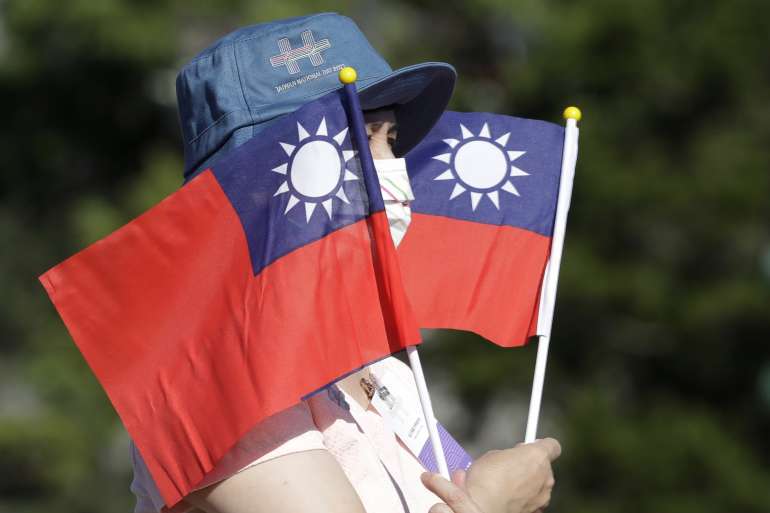New change at the Pentagon waters down focus on Taiwan, critics say

“Anything that dilutes America’s focus on helping Taiwan to defend itself is a really bad idea,” Sen. Dan Sullivan (R-Alaska) told POLITICO. “Pulling Taiwan back into a portfolio dominated by China sends the wrong signal to Beijing — that they can dictate our relationship with the island democracy. Or worse, it will facilitate consultation with Beijing on our approach to Taiwan’s security needs.”
The Defense Department says the move is a bureaucratic change designed to increase internal efficiency within the agency’s policy shop.
But the timing of the move, coming just weeks after a tense standoff in the Taiwan Strait, could not be worse, critics say.
“The Chinese will not interpret this as a coincidence,” said Heino Klinck, who served as the deputy assistant secretary of Defense for East Asia in the Trump administration. “I think unintentionally or perhaps naively, we are signaling that our relationship with Taiwan is a subset of our relationship with mainland China.”
Prior to the Trump administration, both China and Taiwan were under the purview of the deputy assistant secretary of Defense for East Asia, along with nations such as Japan, South Korea and Australia. In June 2019, the Pentagon created an office focused solely on China, a move that experts hailed at the time as putting the necessary focus on Beijing.
But now, the Pentagon is moving the Taiwan desk out from under the East Asia office and into the portfolio of the newly created deputy assistant secretary of Defense for China, Michael Chase, a Defense Department spokesperson confirmed.
“This bureaucratic move will increase efficiency and harmonize efforts within OUSD Policy. Moreover, it aligns staff and leadership with the bureaucratic structures at other executive branch agencies, including the State Department,” said spokesperson John Supple. “In no way does this shift reflect a change in our one-China policy, our commitment to allies and partners, or focus on preserving a free and open Indo-Pacific.”
But within the China portfolio, Taiwan will inevitably get less attention, said Randy Schriver, the former head of Asia policy at the Pentagon during the Trump administration.
“It’s almost inevitable given China’s size that Taiwan becomes a subset,” Schriver said. “Traditionally, Taiwan has been viewed as a problem to manage in the China context and this is a return to that.”
Beijing will likely look favorably on the move, because “it looks like Taiwan is a part of China,” he added.
Chinese President Xi Jinping has said for years he intends to “reunify” the mainland with Taiwan, and he has not ruled out using force to do so. The U.S. military assessed in 2021 that China could invade Taiwan by 2027, an explosive scenario that would likely embroil the U.S. Navy as well as Pacific nations.
The United States’ policy on Taiwan is deliberately ambiguous, although Biden has said the U.S. would come to the island’s defense if it is attacked. The official government position continues to support a One China policy and does not recognize Taiwan as a separate nation, but Washington backs Taipei with arms sales for self-defense.
The Biden administration recently asked Congress to approve an estimated $1.1 billion weapons sale to Taiwan that includes 60 anti-ship missiles and 100 air-to-air missiles — the first since the military exercises in the strait. But critics say more is needed.
“My concern is that again we are unintentionally messaging both mainland Taiwan and the region writ large and globally that in the wake of Speaker Pelosi’s visit and in the wake of what many are referring to as the fourth Taiwan Strait crisis, we are making policy adjustments, policy changes that favor Chinese positions,” Klinck said.
The move has practical implications as well as policy ones. Organizationally, it makes more sense for Taiwan to remain under the East Asia office with responsibility for Japan and Australia, all countries with which the U.S. has strong military relations, said Eric Sayers, a former senior adviser to U.S. Pacific Command and now a fellow at the American Enterprise Institute.
It also makes more sense to align allies and partners under a single deputy assistant secretary, and leave the China office to focus its energies on Beijing, he said.
“I trust Ely’s judgment here,” Sayers said, referring to Ely Ratner, the Pentagon’s assistant secretary for Indo-Pacific affairs, who is responsible for both the China and East Asia offices. “But I also think it’s a good oversight question for Congress to be asking.”